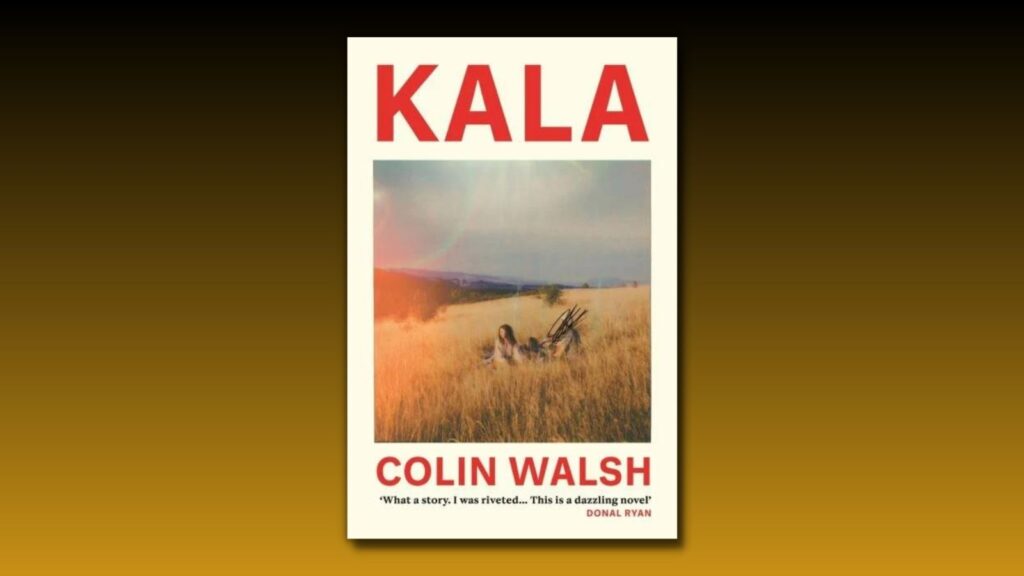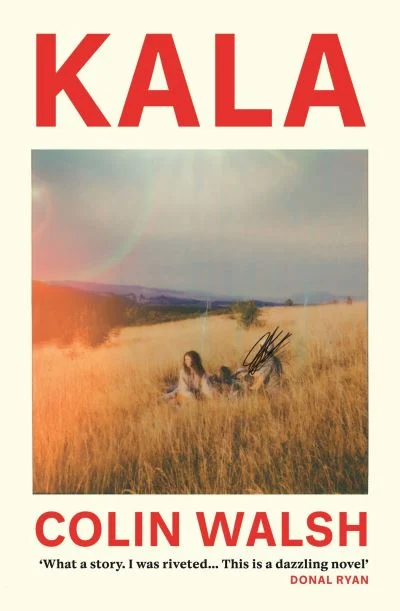
Kala|Colin Walsh|Atlantic Books|€13.99
Ever present tensions— Kala, by Colin Walsh
by Eoghan Smith
It is 2018 in Kinlough, a fictional west of Ireland tourist town, and three friends whose lives have gone very separate ways are about to meet again.
There is Joe, now a preening world-famous singer, replete with millennial self-absorption and a social media obsession. Helen, a freelance journalist, intellectual, prickly and suffering from her own hang-ups about her homeplace, is an emigrant who has returned for her father’s wedding. And then there is Mush, facially scarred and self-conscious, who stayed in Kinlough to work in his mother’s café.
Around these characters and events Walsh builds an engrossing story of how ordinary lives can be destroyed
Together they were half of a larger group of six teenagers in the heady, clumsy flush of youth, one of whom was the bold and beautiful Kala, whose mysterious disappearance fifteen years ago shattered their lives. When Kala’s body is discovered in a nearby wood, Joe, Helen and Mush are forced into an uneasy examination of the past, and when Mush’s younger twin cousins, Marie and Donna, also vanish, they are forced into a brutal confrontation with the present.
Around these characters and events Walsh builds an engrossing story of how ordinary lives can be destroyed by the abuse and corruption that is not only rooted in the structural dysfunctions of Irish society, but in the relationships that people have with each other and the decisions they make.
Escalation of intrigue
Walsh’s debut novel is completely self-assured. He keeps the pace on a steady boil for the first half of the novel, taking time to build the characters and immerse the reader in the micro-cultures of the three main characters—in the early 2000s, and the present day—before allowing the pressure to escape in an escalation of intrigue and internecine violence.
The plot twists frequently and there are just enough clues dropped at the right moments to keep the reader guessing. The narrative is perfectly structured: Joe, Helen and Mush each get their own narratives that interchange from chapter to chapter, allowing the perspective to continually shift.
The plot twists frequently and there are just enough clues dropped at the right moments to keep the reader guessing
The structure also takes the reader between the past and present, between the teenager’s optimistic youthfulness and their damaged adulthoods: as the novel unfolds, we see how each of the characters must reckon with the past. A cast of supporting characters provide a tangled web of relationships (there is a helpful cast list at the beginning of the book). There are friends and parents—some living, some absent, some dead—soon-to-be stepparents, cousins, grandparents, aunts, uncles, and wider family networks.
In Walsh’s novel, people are flawed to greater or lesser degrees
This way of weaving the story through complex familial relationships to its thrilling denouement also allows the reader to understand the deep abuses, tensions, and loyalties between the characters on which the psychological realism of the story hinges. In Walsh’s novel, people are flawed to greater or lesser degrees (though the scale ranging from lesser to greater is very large here), but no one character has a monopoly on the truth, let alone moral rectitude.
Deep, exploratory work
Although Kala is driven by the conventions of the thriller, and is spectacular in its violence, it is much more than a work of genre-fiction. That is not a criticism of genre-fiction, which has its own ingenuities; it is to say that in Kala, Walsh is doing some deeper, exploratory work which is of a piece with larger trends in contemporary Irish fiction (it is not accidental that Helen is an investigative reporter, and her gender is important here too).
Walsh is part of a generation of emergent writers who have been not only unafraid to examine Ireland’s past but have been ambitious and wide-ranging in the literary forms they have employed to undertake that reckoning. In the last ten to fifteen years, Irish poets, dramatists, filmmakers, and novelists have explored a multitude of styles, genres, and forms that have attempted in their own way to untangle the ropes of lies and hypocrisy that kept so much of Irish life in bondage.
in Kala, Walsh is doing some deeper, exploratory work which is of a piece with larger trends in contemporary Irish fiction
In this respect, it is of importance to the story being told here that the victim is a young woman, that her family circumstances are central to her victimisation, and that a culture of secrecy and silence surrounds her disappearance. Kinlough—with the homophonic implication ‘kin lock’—is a small town that stands for the national, where the domestic stands for the entire community, and where the slow, torturous uncovering of history profoundly disturbs the present.
Anti-romantic west of Ireland
Walsh offers us a decidedly anti-romantic vision of the west of Ireland. The west has been prone to idealisation ever since that part of the country was valorised as a space of cultural authenticity by Irish revivalists at the end of the nineteenth century—though writers of and about the west, such as JM Synge, Máirtín Ó Cadhain, Martin McDonagh and Elaine Feeney have disabused such notions.
Such frictions are present too in Walsh, who explores their twenty-first-century manifestations. Though there is a certain smalltown claustrophobia in the tight-knit relationships in the novel, Kinlough does not exist in pastoral isolation; it has undergone the same processes of globalisation and capitalist excess as any Irish town trading on its location and USP. In Kinlough’s case, as with many towns on the western seaboard, this has manifested in the pursuit of the tourist market, where tensions exist between the locals who need to earn a living, and the pleasure pursuing blow-ins (Mush, for instance, regards those down for the annual racing festival as drunken pests).
These tensions between the local and global, between the authentic and the inauthentic, are ever-present and a source of anxiety in the novel
There is an exemplary drunken row between Helen, Mush and Joe about the authenticity of traditional Irish music, in which each one of them—as always happens in these situations as anyone familiar with them knows—says something both sensible and foolish, prejudiced by their own intimacies and complexes about what Irish culture is, and how that Irish culture is presented. These tensions between the local and global, between the authentic and the inauthentic, are ever-present and a source of anxiety in the novel: it is remarked—more than once—that the younger Gen Z kids speak with an American twang.
Violence
Kala is, at times, an extremely violent book. Walsh does not spare the reader in his depiction of viciousness; as the action builds, the second part of the novel is filled with a series of ever more grisly acts of bodily harm. There are acts of enormous cruelty committed by a small group of people who are pretty well-known to each other: we are confronted with murder, kidnapping, torture, rape, incest; sadistically misogynistic threats of female bodily mutilation and gangrape; there are several scenes of attempted strangulation; and the vicious and lethal treatment of dogs. Characters urinate on or soil themselves, either because they are too drunk or because they are unable to move.
In the scenes where characters undergo violent acts, there are echoes—some not so feint either—of acts of evil and corruption perpetuated by people in authority
This physical violence is accompanied by psychological violence, and hatred and malice is frequently expressed in ugly, violent language. But while some readers may find the violence excessive, no one could argue that violence is a stranger to either the Irish imagination—and certainly not to the material reality of Irish history. In this sense, Walsh’s book echoes work by other writers such as Pat McCabe and the aforementioned McDonagh, who reflect national scandals of violence and corruption through the microcosm of the domestic within smalltown Ireland.
In the scenes where characters undergo violent acts, there are echoes—some not so feint either—of acts of evil and corruption perpetuated by people in authority, or with control over others, that is an undeniable part of Ireland’s past: young women shamed and made to suffer for their sexuality; crooked and shoddy policework; the imperative of silence; communities that know but won’t tell; the threat and actioning of brutality; the callous abuse of power; the compromises people make with themselves that do untold damage to others. The memory of these will find their echo in Kala.
Walsh has brilliantly presented this history of violence as a literary thriller with terrific characterisation that keeps the reader fully engaged, searching for fragile buds of hope, and, even now, not a little shocked.

Eoghan Smith is the author of The Failing Heart (Dedalus 2018) and A Provincial Death (2022). His novella A Mind of Winter (Dedalus) will be published in November (2023).












